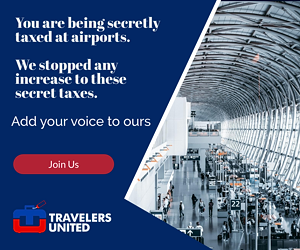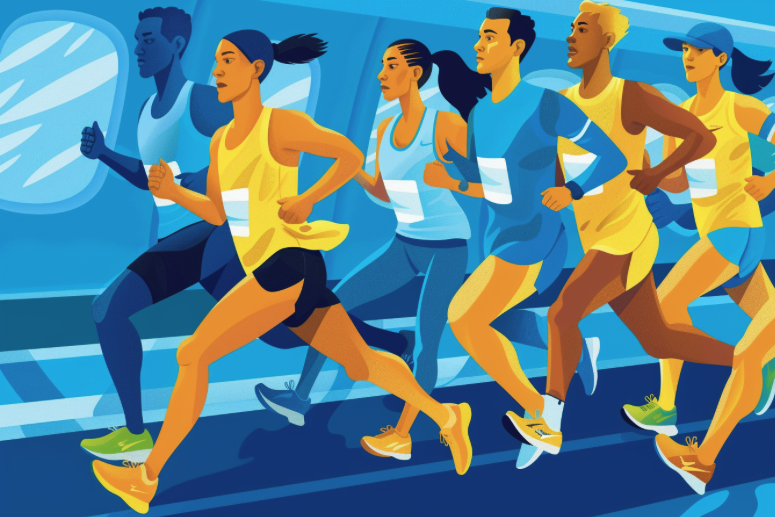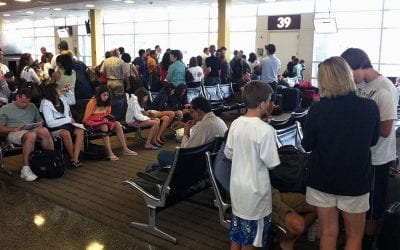It’s not your imagination. Airline passengers suffer from exit envy — they do almost anything to get off the aircraft as soon as it arrives.
I saw it after my recent flight from Los Angeles to Houston landed. I opened the overhead bin to grab my carry-on bag, and I was nearly knocked back in my seat by a guy who was barreling toward the front without even an “excuse me.”
Other air travelers have experienced exit envy, too. As soon as Neil Gupta’s recent flight from Houston to Salt Lake City came to a stop at the gate, an impatient passenger jumped up and sprinted to the front, squeezing past the other passengers.
“He kept saying he had to make a connection,” recalls Gupta, a dentist from Seattle. “I got off and went to the nearest restroom and guess who was washing his hands? Maybe he had a bathroom emergency?”
Nah. It was probably a me-first thing. It’s happening more often, and passengers find it annoying. In fact, 58 percent of travelers surveyed by Kayak said passengers should not rush to get off the plane, even if they have a tight connection.
Yet here we are, on the verge of what will probably be the busiest year for air travel in the history of modern aviation — and people can’t even wait their turn to get off the plane. There’s a reason this is happening and as it turns out, there’s a way to get off the plane early if you need to. I’ll tell you how in just a minute.
Why do passengers want to get off the plane first?

The most commonly used excuse is that they have to make a connection. That seems like a legitimate reason for pushing ahead of everyone else. But when that happens, and there really is a tight connection, flight attendants will usually make an announcement to please remain seated so that those with a connection can disembark first.
But the lone passenger shoving his way to the front of the aircraft? Not buying it.
The other reason? They’re in a hurry and have to urgently get off the plane. Seems legit, too, until you see them waiting at the luggage carousel with the rest of us. The only legitimate emergency I can think of is having to use the bathroom. But planes have bathrooms, so doesn’t that mean they should be rushing to the back of the aircraft?
“There are people who try to exit first under false pretenses, pretending they have a short connection or creating some other faux-urgent need,” says Nick Leighton, an etiquette expert and co-host of the weekly etiquette podcast, Were You Raised By Wolves? “This is rude.”
Got that? The etiquette expert says it’s rude. And I agree.
How to get off the plane first without being rude.
But you can get off the plane early the right way.
“The politest way is to enlist the aid of the flight attendants,” says Jodi RR Smith, an etiquette consultant. “They’ll verify if it’s a legitimate request and ask passengers to allow the connectors to exit first.”
Another strategy that works — and airlines love this one -— is buying a seat closer to the front of the plane. That’s what Edd Horenburger did when he had a short connection on a trip from Tokyo to Philadelphia.
“I paid for an upgrade — and it worked,” says Horenburger, a retired printer from Philadelphia.
Don’t forget — there’s no prize for getting off the plane first. If you’re trying to make a connection, getting to that next flight in time is the only thing that matters.
When the first leg of Kathy Lopez’ flight from New Delhi to Phoenix was delayed, she turned to a flight attendant for help. Instead of letting her off the plane early, the crewmember told her to find her after the plane landed. She did.
“She escorted me through several concourses, bypassed security and onto my next flight,” she says. “If she hadn’t done that, I would have missed my flight — and I would have missed Thanksgiving with my family.”
Whose fault is this early exiting problem?
It would be tempting to blame the rise of these connection con artists on a breakdown of civility in society. But it turns out there’s a reason we’re seeing more of this behavior.
Airlines are largely responsible for the mad exit envy getting the plane. They operate “hub-and-spoke” flights that necessitate a connection, and then they often schedule the connections too close together. That makes passengers nervous and ready to bolt the moment the plane lands.
The fix is more point-to-point flights and more generous connection times so that passengers don’t feel like they have to sprint across the terminal to make their next flight. Oh, I know. There are people in the airline industry who will tell me I don’t know what I’m talking about. But wait until you get knocked over by a nervous passenger on your next flight, and then let’s have a discussion about this.
Elliott’s tips for dealing with exit envy.
If you need to get off the plane first, examine your motives. Do you really need to leave for a legitimate reason or do you just have exit envy?
Book early and consider paying for an upgrade
If you know you have a tight connection, you’ll want to book your flight early so that you have a choice of seat assignments. (If you’re on Southwest Airlines, pay extra for EarlyBird privileges and snag a seat up front.)
Ask if you can get off the plane early
Tell a flight attendant that you need to be off the plane quickly. If it’s a good enough reason, they’ll make an announcement. If it’s not that urgent, ask your fellow passengers if you can get ahead of them. “Most of the time, they’ll oblige because, well, we’ve all been in that situation,” said Anthony Radchenko, CEO of AirAdvisor.
 Don’t forget your rights
Don’t forget your rights
If you miss your connection, your airline will put you on the next available flight at no extra charge, assuming your connection is on the same itinerary. If you have to spend the night at the airport, your airline should also cover your hotel, meal and transportation expenses (although it depends on where you are and which airline you’re on). Your airline can’t just abandon you at the terminal.
READ ALSO:
You may receive $10,000 for denied boarding compensation, but don’t count on it
Venice for the disabled is not easy

Christopher Elliott is an author, consumer advocate, and journalist. He founded Elliott Advocacy, a nonprofit organization that helps solve consumer problems. He publishes Elliott Confidential, a travel newsletter, and the Elliott Report, a news site about customer service. If you need help with a consumer problem, you can reach him here or email him at [email protected].





